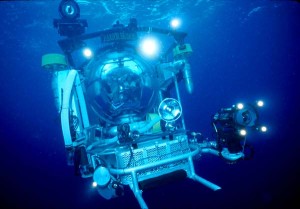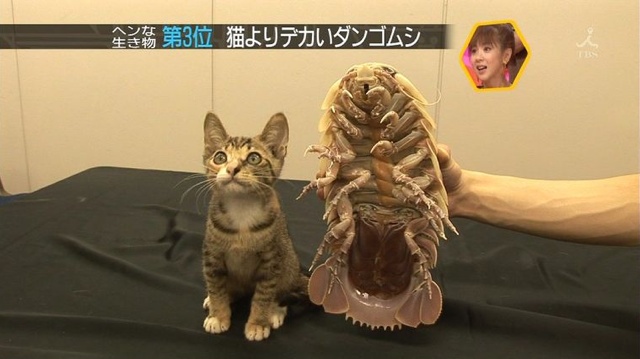At 2 am, the only hints of light are the flecks peaking out from curtained portholes. The red lights of the bridge illuminate the path ahead. I briefly look above; the cloudy skies mask the stars. I return to my position hanging over the rail of the ship. The cool air and light mist feel pleasant on my face. Not nice enough. I enrich the ocean with the last partially digested remnants of my dinner. This is my first oceanographic voyage. Here sick in the middle of the night, I hate the weather that has produced these rough seas, despise the ocean, and regret my choice to become a deep-sea biologist.
At 2 am, I lie here awake in my bunk. After a few days my nausea has passed. Now the gentle rocking of the ship, the soothing hum of the diesel engine reverberating through the ship’s steel frame, and the gentle of lapping of the waves on the hull, cannot coax me asleep. I am more excited than I have ever been. I am busy working on a hypothetical reel of tomorrow’s events. This is my first submersible dive. Here awake in the middle of the night, I ponder the bizarre life of the ocean floor and celebrate my choice to become a deep-sea biologist.
 Well before our 7 am pre-dive check, I am on the aft deck. I am too excited to eat; instead choosing to stare off at Rum Cay in the distance. I should be scared. I am a very, very large and claustrophobic man. Any sane person with my size and affliction would run away from this soda can-sized sub. But the thought of my first visit to the deep sea, the habitat I have dedicated my life to, has flooded my brain with endorphins. With my girth, I am barely able to get through the sub’s hatch. But I am not bothered. I am eager to witness for myself the deep-sea life that I’ve only known from grainy photographs and video. The hour dive to the bottom is filled with a light show of tiny animals that bioluminescence when they brush the sub’s porthole. The entire time dive, nearly 6 hours on the seafloor, I press my face against a 15-centimeter porthole, my cheek against the cold glass, and focused my eyes on the three meters of illuminated sea floor around me and the kilometers of black beyond.
Well before our 7 am pre-dive check, I am on the aft deck. I am too excited to eat; instead choosing to stare off at Rum Cay in the distance. I should be scared. I am a very, very large and claustrophobic man. Any sane person with my size and affliction would run away from this soda can-sized sub. But the thought of my first visit to the deep sea, the habitat I have dedicated my life to, has flooded my brain with endorphins. With my girth, I am barely able to get through the sub’s hatch. But I am not bothered. I am eager to witness for myself the deep-sea life that I’ve only known from grainy photographs and video. The hour dive to the bottom is filled with a light show of tiny animals that bioluminescence when they brush the sub’s porthole. The entire time dive, nearly 6 hours on the seafloor, I press my face against a 15-centimeter porthole, my cheek against the cold glass, and focused my eyes on the three meters of illuminated sea floor around me and the kilometers of black beyond.
When I am speak about my profession—my time at sea in the Atlantic, Pacific, and Antarctic, the rough seas that I have experienced, and my dives in submersibles—with students and the public, I am often asked if I was scared. I am not surprised by this question. Recently, when a Reddit member posed the question “what is the scariest real thing on our earth?” over 6,000 people upvoted the “the ocean.” This was followed by the subsequent comment, liked by over 5,000 people, “the deep ocean.” Not even Alzheimer’s ranked as high.
 Thousand of words—not one scary—come to mind as I think of the deep oceans but none as fitting as imagination. That submersible dive so many years ago continues to inspire my own imagination. It was down there on the sea floor, nearly one kilometer beneath the surface, that I got my first look at the giant isopod, Bathynomus giganteus. Many might view this deep-sea, foot-long, roly-poly as a harbinger of fear. The creature instantly inspired me, launching a journey to understand the sizes of deep-sea animals.
Thousand of words—not one scary—come to mind as I think of the deep oceans but none as fitting as imagination. That submersible dive so many years ago continues to inspire my own imagination. It was down there on the sea floor, nearly one kilometer beneath the surface, that I got my first look at the giant isopod, Bathynomus giganteus. Many might view this deep-sea, foot-long, roly-poly as a harbinger of fear. The creature instantly inspired me, launching a journey to understand the sizes of deep-sea animals.
Many think of the deep sea as a land full of giants. Nothing could be farther from the truth. The deep sea is a kingdom of dwarfs. From clams to crustaceans and snails to sharks, many species are much smaller in the deep than they are in shallower waters where we humans swim. This miniaturization a result of the meager food available in deep ocean where the lack of light precludes photosynthetic organisms that provide ready meals. Many of the deep-sea fish the public knows are much, much smaller than they realize. Take anglerfish, viperfish, hachetfish, and dragonfish. Only oddities like the Giant Isopod reach tremendous sizes for reasons that still escape me today.
The environmental extremes of deep-sea—the massive pressures, the freezing temperatures, lack of light, and scarcity of food—have created extreme evolutionary forces on life. This process has resulted in a diversity of life with magnificent adaptations to meet these challenges. Because these environmental conditions are so outside of our normality here on terra firma, the adaptations of deep-sea animals also seem alien. And this foreignness is perhaps scary to some.
At 2 am, I lay here pondering the word scared. It is something I’ve done a lot of lately. I have been scared. Scared a grant or paper will get rejected. Scared that fieldwork will fail and waste resources. Scared to not become the great scientist I want to be. I am very scared now. I am scared because in just over two months my job and salary will end. I am scared I will have no job to move to. I am scared that I will need to leave science, research, and the oceans behind to find work to provide the basic necessities of life. Here I lay awake with anxiety, I mourn that my career appears near its end, struggle to define my life without the ocean, and ponder my choice to become a deep-sea biologist.
At 7am, I sit hear finishing this post in my local coffee shop. I am preparing to fill out more job applications. Then on to more exciting tasks, finishing off analyses for my wood-fall research. Scared is not the word I want to focus on this morning. I want to remember how that first submersible dive made me feel and the bizarre animals I witnessed. As I type this I think of animals that can feed through their anus, snails larger than small children, complicated invertebrates without toes or gonads, fish with clear skulls, and manta rays that swim like superheroes. Not scared. I choose imaginative. I choose creative. I choose inspiring…
…actually maybe funny because well anus feeding.





May this be a great moment to thank you for inspiring, creative, imaginative research and writings!
(Plus an extraordinary bucket of thanks for the wonder that is Deep Sea News.)
You’re going to Rock your next adventure and I hope you take your readers along, eyes wide open.
Solidarity Dr. M! You will find a thing. This is one of the best blogs on the entire Internet, and your writing, your humor, and your passion will carry you into deep-sea Valhalla! With benefits.
I think of you each and every day and how dedicated you have been to do what you love-the ocean. It saddens me beyond belief that money, the very thing that sustains us, is the very thing that might change your path in life. It seems so unfair, so unjust to force someone that has such compassion for marine life, research, and finding answers away from that because of funding. We are not always blessed with choosing the right career/profession that makes us truly excited and thrilled to get up and go to work each day. But when we do, we want to continue to do it until we no longer choose to do it. In my heart I believe there is still that special place that you will still be able to continue with your work, your passion. I pray it will come soon and it will be long term. I still see the glass half full.
Great post, Craig, thank you!
I do hope your career prospects brighten, soon!
Teresa